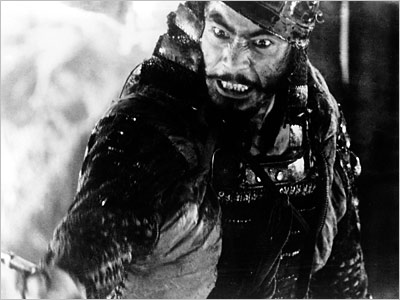This is another year where one of the greatest movies ever made comes in at the #2 slot (see also 1948). How could I relegate Sansho the Bailiff, Kenji Mizoguchi’s epic masterpiece, which on certain days and in certain moods I think might be the best film in cinema history, to runner-up status? Only because in 1954 Mizoguchi’s countryman Akira Kurosawa made perhaps the all-time Movie in the same year, an achievement difficult to deny.
Or vice versa. Maybe the only movie that could top the visceral excitement of Seven Samurai is the mystical journey taken in Sansho. The two films are dissimilar but each leaves you with the sense of having taken a voyage, in space but also in time: each traces an epic arc that makes the world look different in the aftermath. Yes, people say that about movies; but in this case, the trip is vast.
The undeniable Japanese surge during this era (which, on a less exalted level, also included the first Godzilla movie in 1954) is matched by other national cinemas, for the 1950s was a remarkable decade in film in general. ’54 doesn’t stand out as the best year of the decade – the European directors who will dominate the generation to come are still sorting themselves out somehow – but it’s still strong at the top. In Hollywood, the phase of grown-up social-relevence films was topped by On the Waterfront, and the tendency to locate the unease beneath the postwar boom years was getting underway (Douglas Sirk’s Magnificent Obsession opened the door to his string of classics). And Hitchcock was Hitchcock, but even more so. The ten best movies of 1954:
1. Seven Samurai (Akira Kurosawa)
2. Sansho the Bailiff (Kenji Mizoguchi)
3. Rear Window (Alfred Hitchcock)
4. On the Waterfront (Elia Kazan)
5. Voyage to Italy (Roberto Rossellini)
6. Johnny Guitar (Nicholas Ray)
7. La Strada (Federico Fellini)
8. The Far Country (Anthony Mann)
9. A Star is Born (George Cukor)
10. Crime Wave (Andre de Toth)
The good year for Italian cinema continues with the next slot: Luchino Visconti’s Senso, which ties with Magnificent Obsession as rich melodramas writ large. Speaking of which, Gordon Douglas’s Young at Heart is a superb drama that contrasts dark (Frank Sinatra) with light (Doris Day) in a really interesting way. And the first half of Sabrina is one of the best movies Billy Wilder made, and the rest isn’t bad, either.
In the next bunch there’s the Huston lark Beat the Devil, David Lean’s impeccably-made Hobson’s Choice, and three Bunuel pictures: Adventures of Robinson Crusoe, Wuthering Heights, and Illusion Travels by Streetcar. Ingmar Bergman did the excellent A Lesson in Love and Jacques Becker did the irresistible Touchez pas au Grisbi, a memorable evocation of the man’s-man world of the French crime picture.
And a special 1954 award to John Williams – the actor, not the composer – who played the police inspector in Hitchcock’s Dial M for Murder (a performance the director was clearly enjoying) and Audrey Hepburn’s scrupulous father in Sabrina. That’s an awfully fine year for a character actor who never really ascended the heights.
Filed under: Year by Year Best Movies | Tagged: 1954 Ten Best Movies, Akira Kurosawa, Seven Samurai |






But to many of us growing up in the 70’s, John Williams’ best performance was found in a simple mail order record commercial:
“Ah yes, you all remember that lovely melody ‘Stranger in Paradise’. But did you know it is also the Polyvetsian Dance number 2, by Borodin?”
I remember it well, and think of it whenever I hear either piece of music. Williams certainly out-classed Slim Whitman and Boxcar Willie for pitchman suavity. But what do the Polovetzians think?